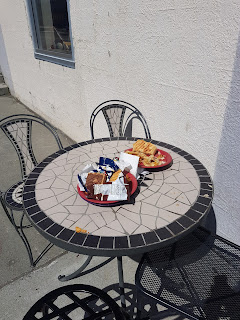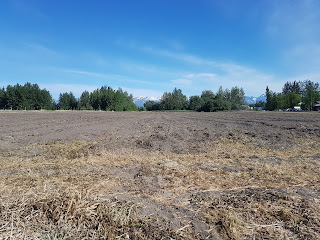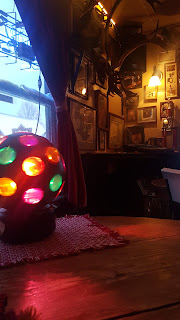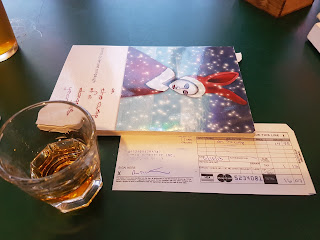August 7th, 1981 – July 22nd, 2023
In the back of the cab, tucked under the front passenger seat, is a paper coffee cup that says, “Thank you for composting me.” That is how we can begin to talk about the life and death of a man named Benjamin Pere Toche. Like the cup, he was polite, articulate, “trash” as he would say, useful, ironic, self-effacing, a vessel for holding, and also stuffed under the seat in a nondescript cab, hoping for someone to see him. And fulfill his request.
He was so many other things, too. More than we can list here. We know we can’t get it right with these words or do him justice. But we’re going to try anyway and we’ll use some of his own words to help.
On August 7th, 1981, Ben emerged onto the world stage at Singing River Hospital in Pascagoula, Mississippi. His mother was studying to become an RN and his father was a day laborer who toiled outside, his skin so mahogany that once he’d been denied service in a shop as the proprietor mistook him for black.
Ben lived in Pascagoula with his parents and two older brothers, Francis and Jude, in a rented, brick-façaded home with a carport on Chicago Drive. He remembered tooling around inside this house on a tricycle, like some kind of inchoate Nascar driver. There was a window in his room, outside of which was a bush — the plant he would “get a switch” from when he’d misbehaved. The bush’s fingers thrashed against the nighttime windowpane, often causing him to retreat to mom’s room for solace. His mom’s bed was nice, warm, and comforting, and she’d put a towel down in case he’d piss himself; and if he did, she never judged or shamed him. He often wondered if mothers, in all their sacrifice, knew how thoroughly they ruined their sons for everyone else on the planet.
His education was Southern and public, after which he spent five years in the Marine Corps as an Arabic linguist. During his service, he found himself within a group of wandering young men and women who shared the hope that the military would be their ticket away from something, to somewhere they could not get on their own. And Ben made a lasting impression. The friendships he formed became some of his longest; as a fellow Marine said, “Every time was the best time when we were all together.” It was not all good times, though. Because he never deployed to Iraq or Afghanistan, he was conflicted about his service. He was glad to have escaped TBI and PTSD and maybe even death, for a while, but ashamed and embarrassed, after all that training and conviction, as he felt unused. Regardless, Ben — and his service mates in return — would eschew trite bullshit and say, lovingly, “Semper Fi, motherfuckers.”
Ben fell in love exactly three times, was married exactly three times, and divorced (almost) exactly three times. He spoke of these relationships reverently and often, as his heart was brimful with love, but he also knew that love to be unwieldy. Although he was sometimes clumsy with it, that love did produce three sons that Ben is, heartbreakingly, leaving behind. Gavin, 18, whom Ben was so proud to watch become a man. Kiernan, 16, in whom Ben saw so much of himself, which was both frightening and wonderful. And Ulysses, 7, a child whose beauty and intelligence consistently astonished Ben. Funnily enough, when Ben was a boy, he remembered telling schoolmates that he wanted to be a dad of nine because he wanted to field a baseball team. His heart certainly contained enough love for all nine of those imagined children; he just overlaid it across three.
And Ben wrote. He was beyond prolific. In 2010, he applied to an MFA program and was accepted. Upon attending, he was thrust into a world filled with “real, genuine people with hypersensitive thoughts and feelings about fucking books, man.” This experience changed his life; Ben once stated, “The impression my MFA friends made on me and the support they’ve shown to me and my life has buoyed me through much suicidal ideation, and they deserve my thanks and apologies for lacking in my own friendship with them.” Which everyone will tell you is just not true. Ben buoyed others far more than he will ever know, likely much more than we buoyed him.
On July 22nd, 2023, Ben died of a broken heart. That is to say, in 1981 a child was born with a heart too big for all this beauty and a temperament too tender to bear the weight of it. He would say that nothing worked out like he thought it would. Being a father didn’t go the way he envisioned it. Nor did being a husband or partner. Ben, like the rest of us, was thwarted by idealistic expectations. He said once, “I really thought someone would be able to live with me, handle all my faults, accept my failings, and we would raise a beautiful and lovely family all on our own. But that seems an impossible thing.” He has now rendered true what should still be unknown.
Ben had an abundance of love. The people in his life loved him for the eccentric, dichotomous, warm, funny, dark, brilliant, wondrous man that he was. In addition to that, he spent most of his adult life working in careers that allowed him to provide guidance and care to those without certain advantages, to the mentally ill, and to the disabled, and they beamed warmth and gratitude back at him. And for his friends and family, he listened to our problems too, loved us, and offered guidance and help. He was the Patron Saint of The Unwell, shouldering the burden of all our pain and strife, and we loved him immensely for that. And for everything else. But sadly, Ben struggled to accept that love, nor could he provide himself the same level of care he extended to others. If he was here to read this, he would tell us to shut the fuck up. Because, folks, beauty is embarrassing. And he was embarrassed to call himself beautiful. To believe himself as beautiful on this earth. But he was. Spectacularly. So, he can shut the fuck up right back.
Well, he already has.
Despite this abundance of love, he felt alone. He felt alone as a child. He felt alone as a man. He felt alone as a father. That is a thing that happens. Hugs, friend. For that we are truly sorry.
He died somewhere between more years than he thought he could give and not as many as the rest of us needed. But he’s not in pain anymore. He’s not here anymore. He’s somewhere else. In fact, as we imagine him now, he is on his couch in the house on Beaver Ave in Palmer, Alaska, Andrea, his wife, sitting at the piano playing Satie’s Gymnopédie No. 1, Uly not yet awake. There’s the fat orange cat, Captain Lawrence Edward Grace “Titus” Oates, basking on the sofa in the low angled morning November sun. There is a convincing air of mystery in the atmosphere. This is a dreamscape.
And later that day, in Ben’s own words:
I watched Uly eat a dried fig and it was positively VanGoghian. I could see the fibers snaking out of the fig’s tooth-pierced flesh in the golden afternoon backblast of overcast skies. Then we went for an excursion in the backyard and asked the spirit of the decaying jack-o-lantern of that year’s Halloween a singular question to which the pumpkin must be truthful in answering.
“How do you get up the hill,” Uly asked in a rising boyish voice.
“Don’t ask that,” I said, “He only tells the truth for the first question. The other ones he might lie, and you already know how to get up the hill. It’s right there.” I pointed with my coozied beer.
“Ask it another question, Uly-bear. A big one. Like, what does it all mean? Or, why are we here?” Andrea suggested.
“Who knows if he’ll tell you what’s right,” I said.
Uly, in his black snow-pant bibs and green hat and red jacket and yellow and black mittens grabbed the planter box’s wooden edge and faced the crumbling and moldy child-faced jack-o-lantern, the one of his own design, once more. “How does wood become wood?”
I looked around me. The inclined backyard that is the backdrop to our quaint, cedar paneled home on Beaver Avenue lay dotted with juvenile cottonwoods, the same ones in which my oldest two boys, Gavin and Kiernan, played pretend, fending off imagined enemies from their forest fortress, in a three-month removed summer that seemed forever ago when I saw them in the throes of their childhoods, still reaching for the true meaning of play. I put my hand against the trunk of the closest tree before launching into a monologue about how photosynthesis creates glucose and glucose becomes energy and how the ever-expanding circumference of a tree was the only truly living layer of that structure with the basement floors being continually converted into a dead carbon backbone on which the living crust seethed.
Then we went down and took the cat inside and made tamales, goopy ones, but ones still excellent in taste and almost preferable to the more toothy of masas and we ate and drank and now it’s Lana Del Rey again and golden tones and love and it’s too too good.
To Ben, we’d like to say…maybe you should have let Uly ask the pumpkin how to get up the hill. Because you didn’t make it, friend; not nearly as far as we needed you to go. But we know it’s been a steep hike for you. Very, very difficult. We know you did your best. And we know you made it as far as you could. But that’s really frustrating, Ben. We miss you, man. We cannot contain it. You are such a big part of our collective fabric. The ponchoed parts of the cloth, with llamas and ravens, eagle feathers woven in there too.
No one wants to say goodbye. No one knows how to say goodbye. So we won’t. We know you were fond of saying, “You can never go home.” So, what we will say, sir, is: Welcome Home. Get the fire going. Find some good books. Write down what you can. And breathe. Go easy on yourself this time. Nothing can hurt you now, not even you. And don’t worry. We’ll all be along shortly. Save us a seat. We’ll have so very much to talk about.
Ben’s life will be celebrated on the 25th of August, 2023, 2:00PM, at Matanuska River Park in Palmer, Alaska, where his ashes will be composted amongst the alluvium and waters of the Matanuska River.
(written by Nicholas Dighiera and Daniel Mickelson)




















.jpg)































